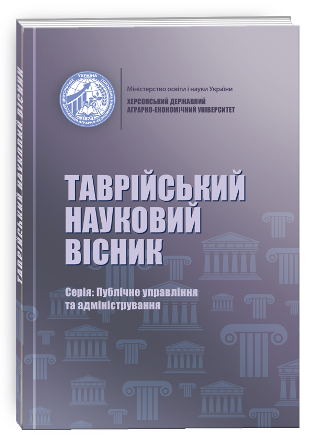FUNDAMENTALS OF SECURITY CONCEPT AND THEIR IMPACT ON PUBLIC INSTITUTIONS RUNNING
DOI:
https://doi.org/10.32782/tnv-pub.2025.1.11Keywords:
security, national stability, risks, threats, public policy, state power, public institutions, strategic goals, international systemAbstract
The paper deals with the essence, key theoretical aspects, origin and genesis of the security concept. The study reveals that security is a complex multifaceted social phenomenon with its specific historical character. It is closely related to all interaction forms and directions within the system nature – man – society and its essence implies living securely, free of anxiety, peacefully, without any risks or threats. From the standpoint of the theory of realism, liberalism and constructivism, this term can be applied with the following three meanings: the traditional meaning implies security as an attribute of the state, absence of military conflict i.e. military security; “security” used in a broader sense, but still referred directly to phenomena occurring in international relations, or directly / indirectly caused by interstate relations; security as a public benefit – implied in its universal (as a unit and the social entity) ‒ human security. A wide range of the security threats faced by our state has been identified. These include encroachment on the sovereignty and territorial integrity, blocking the state's movement towards full membership in the EU and NATO, conducting intelligence and subversive activities by Russian special services against Ukraine, carrying out propaganda, cyberattacks, and spreading terrorism financed and supported by the foe. The study substantiates the need for close cooperation between various public institutions, such as law enforcement agencies, security services, local government bodies etc. since security is a constant social process with the participants trying to improve the mechanisms that ensure their security. These institutions must clearly realize the concepts of security and organize effective interagency interaction. The basis for their effective work is an understanding of the essence of security, which determines political and administrative activities, influences decision making, ensures national stability, and contributes to the development of trust between institutions and citizens.
References
Singh, Anand K. Concept of National Security: An Overview. InJournal of Emerging Technologies and Innovative Research. 2015. Vol. 2, Issue. 12. Р. 1920-1925.
Liotta P. H. Boomerang Effect: The Converegence of National and Human Security. Security Dialogue. 2002. Vol. 33, no. 4. P. 473-488.
Smith C. L. Security science: An emerging applied science. Journal of the Science Teachers Association of Western Australia. 2001. Vol. 37 (2). Р. 8-10.
Баранівський В.Ф., Л.М. Будагьянц, Чорний В.С. та ін. Філософсько-методологічні проблеми військово-соціального управління: підручник. К.: НУОУ, 2011. 305 с.
Власюк О. С. Національна безпека України: еволюція проблем внутрішньої політики: Вибр. наук. праці. К. : НІСД, 2016. 528 с.
Пилипчук В.Г. Формування теоретико-правових основ забезпечення державної безпеки України (кінець ХХ – початок ХХІ століття): монографія. Київ, 2008. 256 с.
Сьомін С. В. Концепт аксіологічної парадигми засадничих принципів і ціннісних засад забезпечення національної безпеки України. [Електронний ресурс] / НІСД. 2019. Режим доступу: https://niss.gov.ua/en/node/195
Бобров Є. Сучасні підходи до дослідження економічної безпеки. Економіка України. 2012. № 4. С. 80-85.
Kaufman, D., McKitrick, J., Leney, T. US National Security: A Framework for Analysis. Lexington, MA: «Lexington Books». 1985. 584 р.
Manunta G . What is security? Security Journal. 1999. Vol. 12 (3). Р. 57-66.
Morgenthau Hans J. Politics Among Nations: The Struggle for Power and Peace. Brief Edition revised by Kenneth W. Thompson. New York: McGraw-Hill, 1993. Р. 3.
Collins A. (ed.). Contemporary Security Studies. New York: Oxford University Press. 2013. 479 р.
Brauch H.G. Concepts of Security Threats, Challenges, Vulnerabilities and Risks. Retrieved from: https://elearn.uni-sofia.bg/pluginfile.php/322212/mod_resource/content/1/Vunerability.pdf. Springer, Berlin, 2011. Р. 61-106.
Hughes C.W., Lai Y.M. (Eds.). Security Studies: A Reader (1st ed.). London. 2011. 472 р.
Buzan, Barry. People, States and Fear: An Agenda for International Security Studies in the Post-cold War Era Harvester Wheatsheaf, 1991. 396 р.
Czesław Mesjasz. Economic security. 2004. Retrieved from: http://www.afes-press.de/pdf/Mesjasz_Economics_Security.pdf. Paper presented at the IPRA General Conference 5 July 2004 – 9 July 2004 Sopron, Hungary.
Krause, K., Williams M. C. Broadening the Agenda of Security Studies: Politics and Methods. Mershon International Studies Review. 1996. Vol. 40, no. 2. Р. 229-254.
Шевченко Л. С., Гриценко О. А., Макуха С. М. та ін. Економічна безпека держави: сутність та напрями формування: монографія / за ред. д-ра екон. наук, проф. Л. С. Шевченко. Х.: Право, 2009. 312 с.
Указ Президента України від 14.09.2020 року № 392/2020. Стратегія національної безпеки України. [Електронний ресурс]. Режим доступу: https://www.president.gov.ua/documents/3922020-35037.
Указ Президента України від 25.03.2021 № 121/2021. Стратегія воєнної безпеки України. [Електронний ресурс]. Режим доступу: https://www.president.gov.ua/documents/1212021-37661.
Указ Президент України від 16.02.2022 року № 56/2022. Стратегія забезпечення державної безпеки. [Електронний ресурс]. Режим доступу: https://www.president.gov.ua/documents/562022-41377.
Закон України. Про основи національного спротиву. Відомості Верховної Ради (ВВР), 2021, № 41, ст.339. Редакція від 05.01.2025. [Електронний ресурс]. Режим доступу: https://zakon.rada.gov.ua/laws/show/1702-20#Text.
Указ Президент України від 28 грудня 2021 року № 685/2021. Стратегія інформаційної безпеки. [Електронний ресурс]. Режим доступу: https://www.president.gov.ua/documents/6852021-41069.
Резнікова, О. О. Національна стійкість в умовах мінливого безпекового середовища: монографія. Київ : НІСД. 2022. 456 с.







